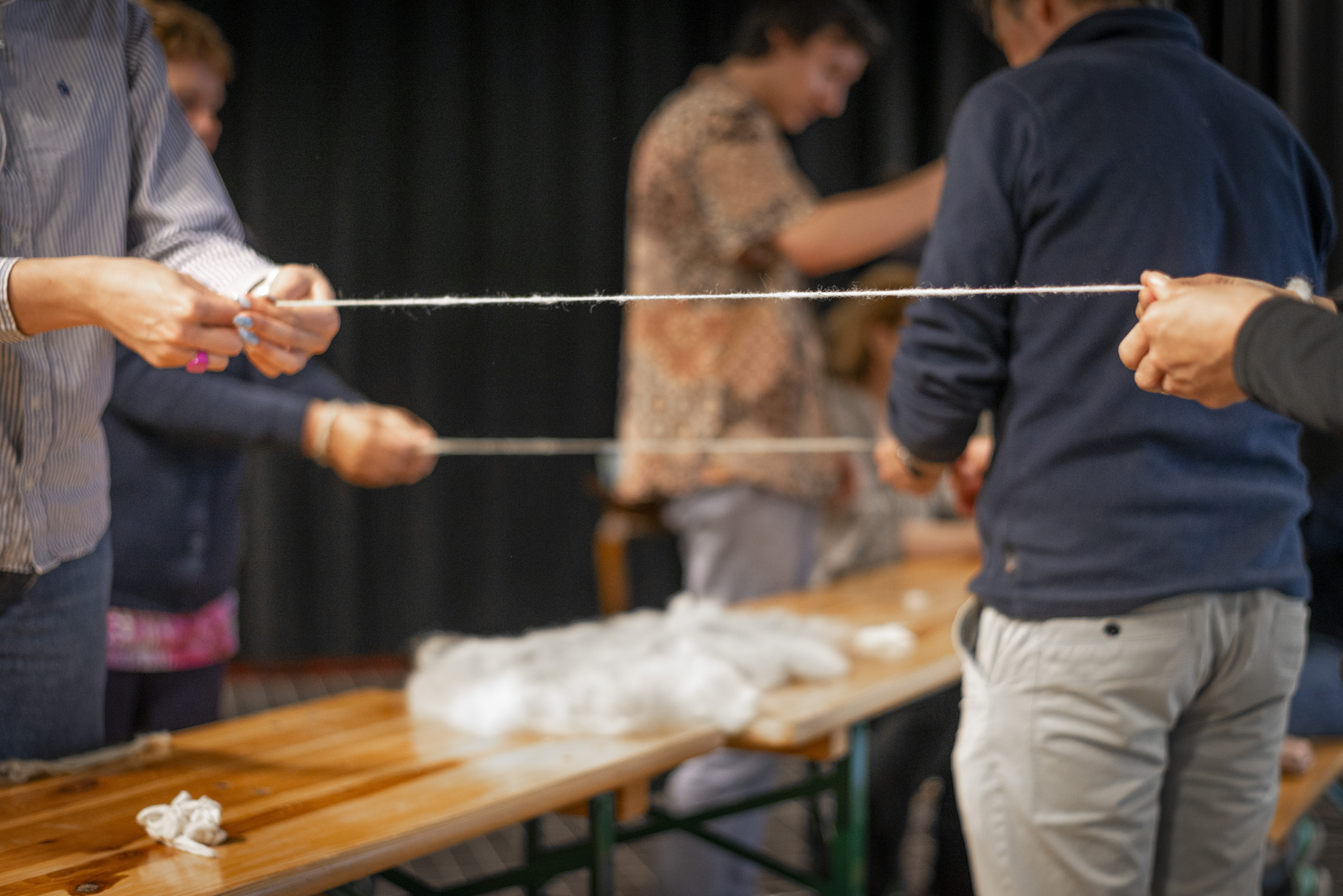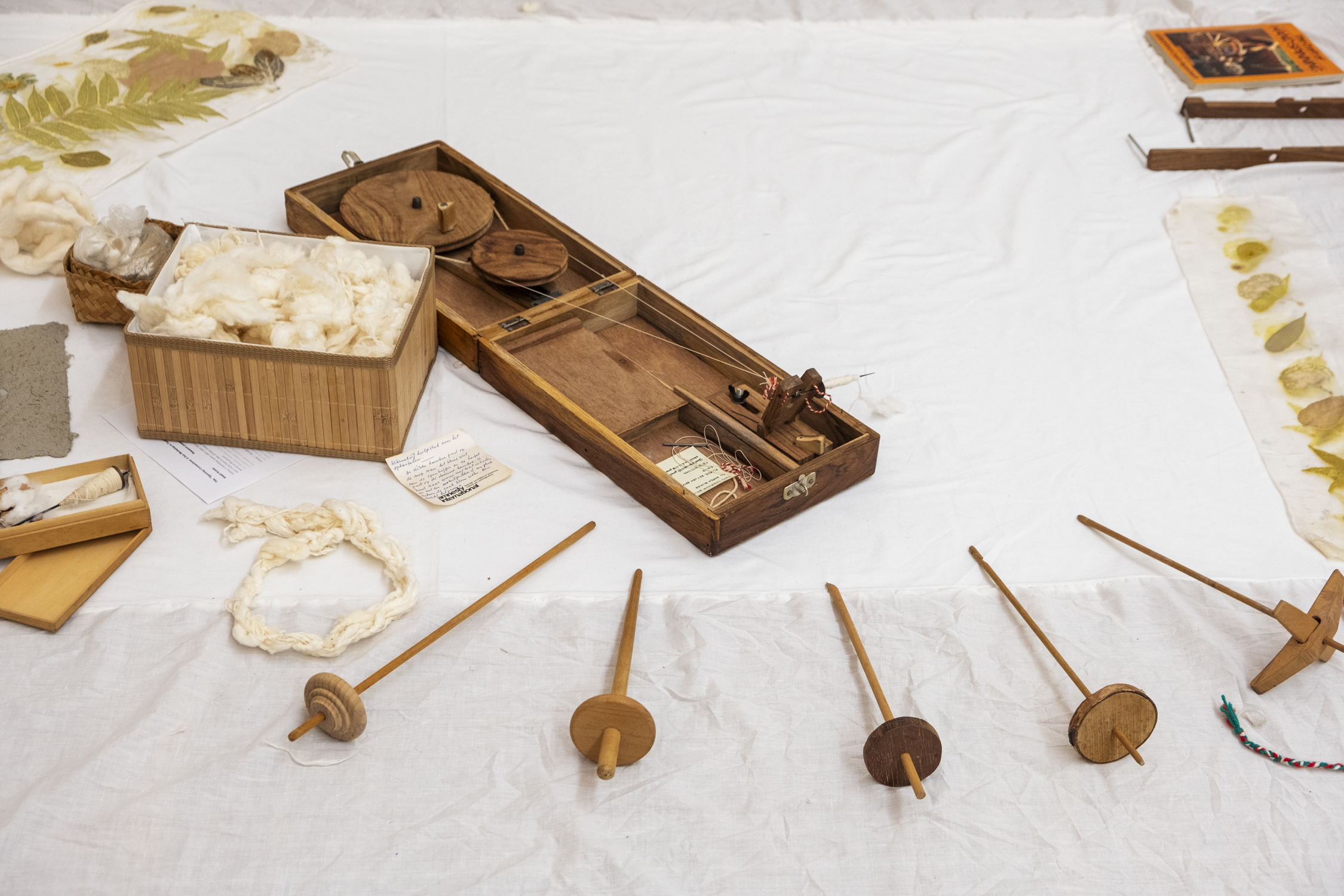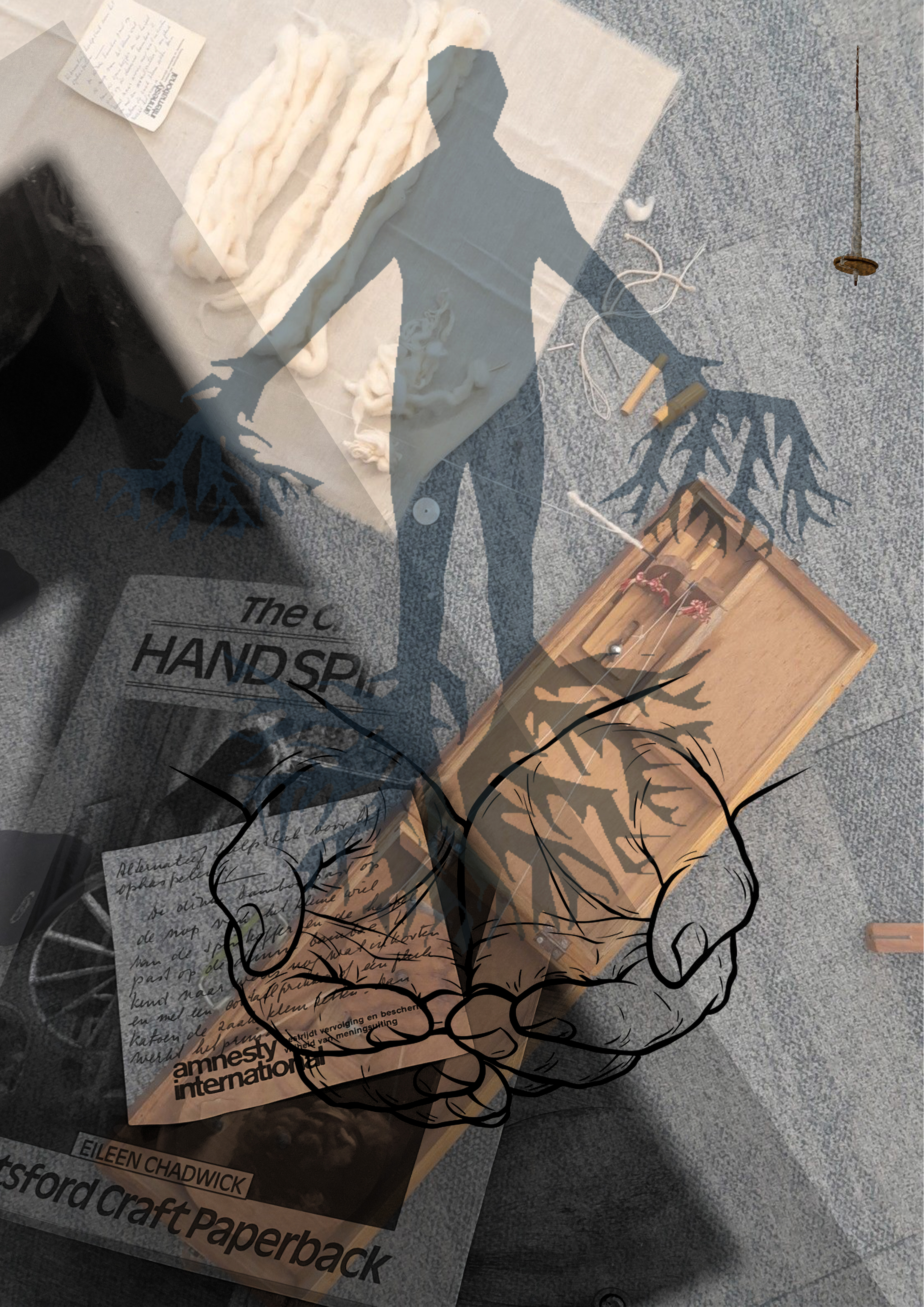Crafting Contagious Connections:
Pedagogies of the Hand
–
Akash Kumar
Pedagogies of the Hand
–
Akash Kumar
Nani picks the soil with her fingers and smells it: “We need to wait for two more weeks to sow our seeds.” Her hands, heart, and head knew.
The audience encounters a vibrant, dynamic space of knowledge transmission designed to offer a curriculum that engages the hands, heart, and head. Crafting Contagious Connections is a culmination of a year-long participatory research project. Involving people from 8 to 70 years old focusing on learning by doing as a method of knowledge transmission.
![]()
The project is a shed in the KABK garden which features a series of workshops and actions such as spinning, natural dyeing, eco printing that encourage and develops interactive learning. The setup hosts various activities to test and refine the methods, with participant feedback playing a crucial role. In development of this some workshops will be facilitated by the participants who learned during previous workshops. This open, participatory environment enables visitors to engage and contribute to the learning process, while I facilitate, plan these moments and workshop firsthand.
![]()
This project is rooted in my personal experiences with my grandmother, whose unique hands-on knowledge transmission shaped my early learning. During my formal higher education – with its emphasis on rational, abstract, market-driven, theocratical knowledge. I felt a growing disconnection from the participatory, community-integrated learning of my childhood, as it became increasingly replaced by detached forms of knowledge. This realization prompted me to explore and prioritize crafting as a method of thinking and learning.
![]()
My research led to the development of pedagogical methods that mirror my grandmother's teaching style, blending hands-on activities, emotional engagement, and exploration. This pedagogy aims to reconnect learners with tactile and community-based experiences, fostering a craft-based approach that employs local resources, learns from the seasons and natural cycles of regeneration. It is an approach to education that values diverse methods of knowing and transmitting knowledge.
![]()
![]()
![]()
The broader relevance of my project lies in bridging the gap between vernacular, active learning and modern, abstract learning. John Dewey's experiential learning theory* underscores the significance of learning through direct experiences. By integrating crafting and experiential methods, I aim to highlight the value of learning that engages the whole person – but first the Hand, rather than the 3H model which focuses on the “Head, Heart, Hands” first put by Orr in 1992. Through action based making, learners forge embodied cogitation with materials, people, and spaces. Simultaneously, they reflect on their actions, engaging their minds, because new inquiry emerges along the action-based learning. This approach is crucial for educators, designers, and policymakers who seek more inclusive and effective methods of knowledge transmission.
My project challenges conventional definitions of knowledge sharing by promoting context-rich education. Emphasizing craft and nature-based learning, it fosters creativity and community in education and beyond. It aims to redefine ways of teaching to be more holistic, engaging, and adaptable, nurturing individuals who are deeply connected to their craft, design, and the natural world.
![]()
Learning with one’s hands and natural materials is crucial because it fosters a deep, tactile understanding of the world, encouraging creativity and personal growth. My personal and professional experiences in both the craft sector and a large industrial company have revealed how hands-on work shapes a unique worldview. Moving to the Netherlands, I further discerned the difference between knowing and knowledge. At MID, I learned to integrate practical skills with intellectual and emotional insights. After graduating, I aim to share my knowledge and design through a holistic approach, using hands, heart, and head to inspire others and promote a comprehensive understanding of learning and creating.
![]()
![]()
The audience encounters a vibrant, dynamic space of knowledge transmission designed to offer a curriculum that engages the hands, heart, and head. Crafting Contagious Connections is a culmination of a year-long participatory research project. Involving people from 8 to 70 years old focusing on learning by doing as a method of knowledge transmission.

The project is a shed in the KABK garden which features a series of workshops and actions such as spinning, natural dyeing, eco printing that encourage and develops interactive learning. The setup hosts various activities to test and refine the methods, with participant feedback playing a crucial role. In development of this some workshops will be facilitated by the participants who learned during previous workshops. This open, participatory environment enables visitors to engage and contribute to the learning process, while I facilitate, plan these moments and workshop firsthand.

This project is rooted in my personal experiences with my grandmother, whose unique hands-on knowledge transmission shaped my early learning. During my formal higher education – with its emphasis on rational, abstract, market-driven, theocratical knowledge. I felt a growing disconnection from the participatory, community-integrated learning of my childhood, as it became increasingly replaced by detached forms of knowledge. This realization prompted me to explore and prioritize crafting as a method of thinking and learning.

My research led to the development of pedagogical methods that mirror my grandmother's teaching style, blending hands-on activities, emotional engagement, and exploration. This pedagogy aims to reconnect learners with tactile and community-based experiences, fostering a craft-based approach that employs local resources, learns from the seasons and natural cycles of regeneration. It is an approach to education that values diverse methods of knowing and transmitting knowledge.



The broader relevance of my project lies in bridging the gap between vernacular, active learning and modern, abstract learning. John Dewey's experiential learning theory* underscores the significance of learning through direct experiences. By integrating crafting and experiential methods, I aim to highlight the value of learning that engages the whole person – but first the Hand, rather than the 3H model which focuses on the “Head, Heart, Hands” first put by Orr in 1992. Through action based making, learners forge embodied cogitation with materials, people, and spaces. Simultaneously, they reflect on their actions, engaging their minds, because new inquiry emerges along the action-based learning. This approach is crucial for educators, designers, and policymakers who seek more inclusive and effective methods of knowledge transmission.
My project challenges conventional definitions of knowledge sharing by promoting context-rich education. Emphasizing craft and nature-based learning, it fosters creativity and community in education and beyond. It aims to redefine ways of teaching to be more holistic, engaging, and adaptable, nurturing individuals who are deeply connected to their craft, design, and the natural world.

Learning with one’s hands and natural materials is crucial because it fosters a deep, tactile understanding of the world, encouraging creativity and personal growth. My personal and professional experiences in both the craft sector and a large industrial company have revealed how hands-on work shapes a unique worldview. Moving to the Netherlands, I further discerned the difference between knowing and knowledge. At MID, I learned to integrate practical skills with intellectual and emotional insights. After graduating, I aim to share my knowledge and design through a holistic approach, using hands, heart, and head to inspire others and promote a comprehensive understanding of learning and creating.

